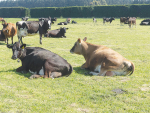Farmers are being urged to make their veterinarians an integral part of their farm management team.
This is the advice of Britain’s Chief Veterinary Officer (CVO) Professor Christine Middlemiss who was in New Zealand recently for discussions with her fellow CVO’s from New Zealand, Australia, Canada and the US. The group meet once a year and NZ hosted the meeting this year.
Middlemiss says issues discussed this time round included microbial resistance, a world-wide shortage of vets as well as ongoing biosecurity and animal health and welfare.
There is clear evidence that shows that vets are trusted independent advisors and can offer a lot more than just turning up to deal with a sick animal, she adds.
“They are not just your animal health team, but they are also your business team because we can work with farmers to prevent problems occurring on farm and this makes good economic sense. They can also offer good advice around nutrition and grass management,” she says.
Middlemiss says vets are also well clued up on wider issues around farming through their links to their own professional body and government and industry organisations, and having the right information is key step to making the right on-farm decision. She says the other positive that vets bring to a farming business is that their decisions and information is based on strong scientific evidence.
Meanwhile, Middlemiss says one of the challenges facing the profession internationally is a shortage of vets and the fact that many are leaving the profession quite soon after they have graduated. She says this is despite the fact the number of graduates has increased. One of the reasons for the shortages in the UK, Middlemiss believes, is that during Covid, more people got pets for company which grew the demand for vets.
One somewhat puzzling statistic that Middlemiss points to in the UK is that 75% of those who stopped practicing as vets did so within four years or less after graduating.
“This doesn’t mean their skills are not being used. Some have joined the government food safety, others are working for pharmaceutical companies and jobs where their veterinary skills are very relevant,” she says.
Middlemiss says another reason for people leaving a veterinary practice may be long hours and the lack of a work-life balance. She says she’s also heard of instances where vets are sick of being shouted at and abused by demanding members of the public and that such stress is unbearable.
In terms of the public, Middlemiss says as Britain’s CVO and principal advisor to the government on matters relating to animal health, welfare and related issues, she has developed close links with NGOs and relevant stakeholders. She says her office and the professional veterinary associations in the UK make a point of keeping the public and stakeholders well informed about what they do and what issues are in the pipeline.
But fundamentally, says Middlemiss, the veterinarian profession hasn’t changed over the years. She says vets are service providers and a key to that is being able to communicate the knowledge they have to clients.


















